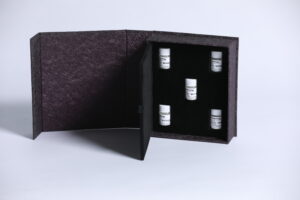The quality of the PEG standards is very important for GPC characterization of PEGs and PEGylated products. PEG GPC Calibration Standard Kits from JenKem Technology contain inactive hydroxyl-ended linear and 4arm PEG raw material standards, with narrower polydispersity and more accurate molecular weights compared to other PEG standards on the market. The molecular weight of the JenKem® PEG standards is determined by MALDI-TOF. The polydispersity of the JenKem® PEG standards is determined via GPC.

JenKem Technology’s Methoxy PEG GPC Calibration Standards kit (STDMPEG) includes 200mg each of M-PEG-2000, M-PEG-5000, M-PEG-10K, M-PEG-20K, and M-PEG-40K.
JenKem Technology’s 4ARM PEG GPC Calibration Standards kit (STD4ARMPEG) includes 200mg each of 4ARM-PEG-2000, 4ARM-PEG-5000, 4ARM-PEG-10K, 4ARM-PEG-20K, and 4ARM-PEG-40K. JenKem Technology reports the total molecular weight of multi-arm PEG raw materials as the sum of the molecular weights of all the arms. The number of ethylene oxide units in the PEG chain may not be equal for all arms.
| PEG PRODUCT | INCLUDED MW | MAIN PEAK FRACTION BY GPC | POLYDISPERSITY BY GPC |
|---|---|---|---|
| Methoxy PEG 2kDa, 5kDa, 10kDa, 20kDa, 40kDa | ≥ 95% | ≤ 1.05 | |
| 4ARM-PEG 2kDa, 5kDa, 10kDa, 20kDa, 40kDa | ≥ 95% | ≤ 1.05 |
Gel permeation chromatography (GPC) is a type of size exclusion chromatography. GPC separates mixture components based on size, and it can be used to determine the number average molecular weight (Mn), weight average molecular weight (Mw), and peak average molecular weight of polymers. GPC is commonly used to determine the polydispersity of the polymers, which is the weight average molecular weight (Mw) over number average molecular weight (Mn).
Matrix-assisted laser desorption/ionization (MALDI) is a soft ionization technique used in mass spectrometry, allowing the analysis of polymers which tend to be fragile and fragment when ionized by more conventional ionization methods. The accuracy of MALDI-TOF is about 0.1% – 0.01%, much higher than that of SDS and GPC.
References
- Croitoru-Sadger, T., et al., Two-component cross-linkable gels for fabrication of solid oral dosage forms, Journal of Controlled Release, 2019.
- Abolmaali, S.S., et al., Nano-hydrogels of methoxy polyethylene glycol-grafted branched polyethyleneimine via biodegradable cross-linking of Zn2+-ionomer micelle template, Journal of nanoparticle research, 2013, 15.12.
- Prednisolone-α-cyclodextrin-star poly(ethylene glycol) polypseudorotaxane with delayed pH-sensitivity as a targeted drug delivery system, International Journal of Pharmaceutics, 2011, 414:1–2, 29, P. 42-47.
- Prednisolone-a-cyclodextrin-star PEG polypseudorotaxanes with controlled drug delivery properties, Org. Biomol. Chem., 2010, 8, 5423–5430.
- Targeted antifungal delivery system: β-Glucosidase sensitive nystatin–star poly(ethylene glycol) conjugate, International Journal of Pharmaceutics, 2010, 386(1–2), p: 1–5.
Founded in 2001 by experts in PEG synthesis and PEGylation, JenKem Technology specializes exclusively in the development and manufacturing of high quality polyethylene glycol (PEG) products and derivatives, and related custom synthesis and PEGylation services. JenKem Technology is ISO 9001 and ISO 13485 certified, and adheres to ICH Q7A guidelines for GMP manufacture. The production of JenKem® PEGs is back-integrated to in-house polymerization from ethylene oxide, enabling facile traceability for regulated customers. JenKem Technology caters to the PEGylation needs of the pharmaceutical, biotechnology, medical device and diagnostics, and emerging chemical specialty markets, from laboratory scale through large commercial scale.
